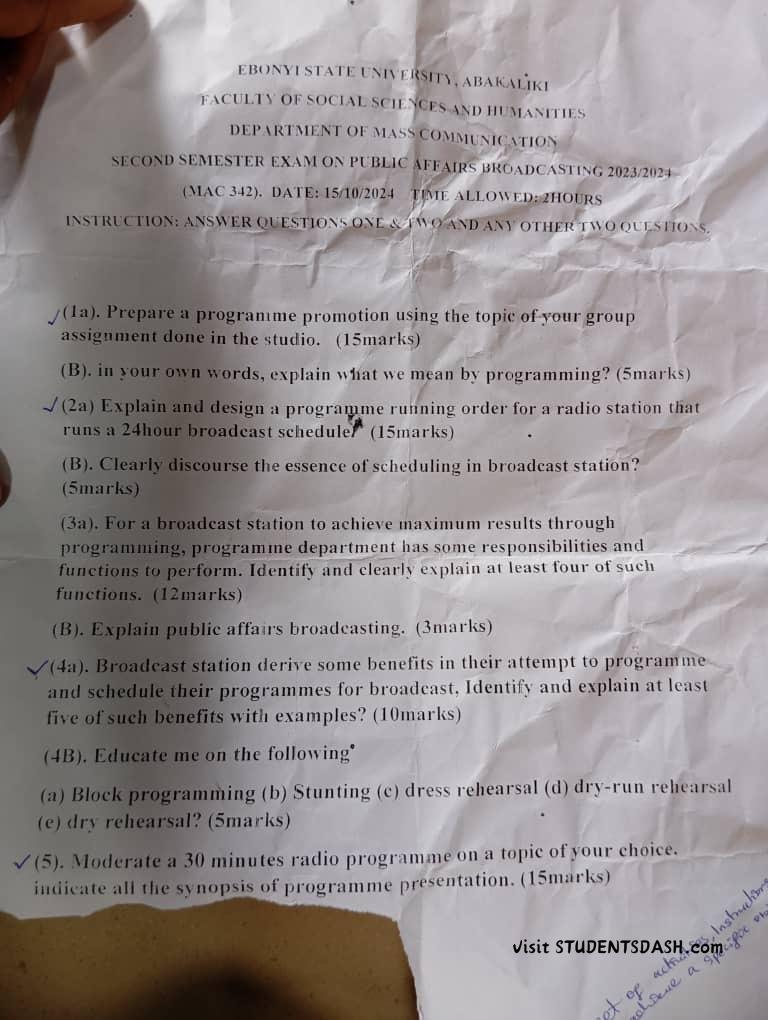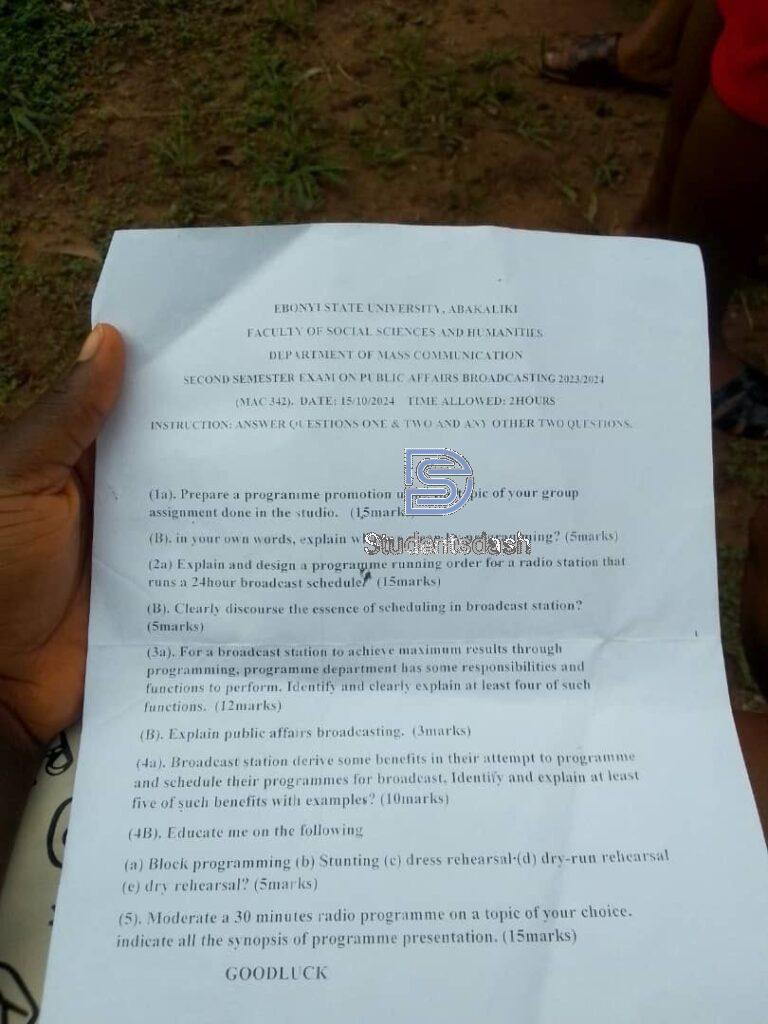MAC 342 Past Questions and Answers


EBONYI STATE UNIVERSITY, ABAKALIKI
FACULTY OF SOCIAL SCIENCES AND HUMANITIES
DEPARTMENT OF MASS COMMUNICATION
SECOND SEMESTER EXAM ON PUBLIC AFFAIRS BROADCASTING 2023/2024
(MAC 342) DATE: 15/10/2024 TIME ALLOWED: 2 HOURS
INSTRUCTION: ANSWER QUESTIONS ONE & TWO AND ANY OTHER TWO QUESTIONS.
(1a). Prepare a programme promotion using the topic of your group assignment done in the studio. (15marks)
Answer:
Coming soon on EBSU Radio 99.1 FM, join us for our exciting programme titled “Youth and Nation Building”. It is a special talk show that discusses the role of young people in developing Nigeria. Don’t miss the lively interviews, educative discussions, and inspiring messages. Tune in every Wednesday by 4pm for Youth and Nation Building on EBSU Radio. Stay informed, stay empowered!
(1b). In your own words, explain what we mean by programming? (5marks)
Answer:
Programming means the planning, selection, and arrangement of broadcast content into a schedule for radio or television to meet the needs of the audience.
(2a). Explain and design a programme running order for a radio station that runs a 24hour broadcast schedule. (15marks)
Answer:
A 24-hour running order means dividing the day into different time belts and assigning programmes. Example:
- 6:00am – 9:00am: Breakfast show (news, weather, traffic updates, music)
- 9:00am – 12:00pm: Magazine/educational programmes
- 12:00pm – 2:00pm: Midday music and talk show
- 2:00pm – 4:00pm: Phone-in interactive programme
- 4:00pm – 7:00pm: Drive-time show (news, sports, interviews)
- 7:00pm – 10:00pm: Entertainment and drama
- 10:00pm – 12:00am: Night news and analysis
- 12:00am – 6:00am: Music, repeats, and light programmes
(2b). Clearly discourse the essence of scheduling in broadcast station? (5marks)
Answer:
Scheduling helps to organize programmes properly, avoid clashes, meet audience needs at the right time, attract sponsorship, and maintain a steady flow of content.
(3a). For a broadcast station to achieve maximum results through programming, programme department has some responsibilities and functions to perform. Identify and clearly explain at least four of such functions. (12marks)
Answer:
- Planning: Designing programme schedules that fit the station’s goals.
- Content selection: Choosing suitable programmes for the audience.
- Supervision: Monitoring and evaluating programmes to maintain quality.
- Coordination: Working with producers and presenters to ensure smooth running.
(3b). Explain public affairs broadcasting. (3marks)
Answer:
Public affairs broadcasting refers to programmes that deal with political, social, and community issues, aimed at informing and educating the public on matters that affect them.
(4a). Broadcast station derive some benefits in their attempt to programme and schedule their programmes for broadcast. Identify and explain at least five of such benefits with examples? (10marks)
Answer:
- Audience satisfaction: Example – scheduling news at 7pm when people are home.
- Advert revenue: Example – placing ads during prime time shows.
- Orderly operations: Example – avoiding programme clashes.
- Consistency: Example – listeners know when to expect their favourite shows.
- Effective resource use: Example – assigning producers/presenters to time slots efficiently.
(4b). Educate me on the following (5marks)
(a) Block programming
(b) Stunting
(c) Dress rehearsal
(d) Dry-run rehearsal
Answer:
(a) Block programming: Grouping similar programmes together in a time belt.
(b) Stunting: Using unusual content or method to attract attention.
(c) Dress rehearsal: Final practice with all costumes and equipment before live show.
(d) Dry-run rehearsal: Testing programme flow without costumes or full set-up.
(5). Moderate a 30 minutes radio programme on a topic of your choice. indicate all the synopsis of programme presentation. (15marks)
Answer:
Programme Title: “Campus Health Talk”
Duration: 30 minutes
Synopsis/Outline:
- Intro (2mins): Welcome listeners, introduce topic “Stress Management for Students.”
- News bit (3mins): Health updates from WHO.
- Discussion (10mins): Talk with a guest doctor on causes and effects of stress.
- Phone-in segment (10mins): Listeners call to share experiences and ask questions.
- Closing (5mins): Summary of key points, thank guest and audience, play closing music.

